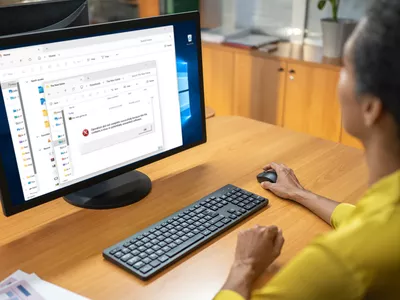
In 2024, How to Erase an Apple iPhone 7 Plus without Apple ID?

How to Erase an Apple iPhone 7 Plus without Apple ID?
Our generation is all about high-performance gadgets and, a phone is one of the most important of it all. But with the concept of a smartphone, things have changed. iPhone/iPad has emerged as an important fashion quotient for a long now.
We often end up buying second-hand iPhones/iPads or sell our old version of the phones/pads to an unknown person and buy a new version of other brands, like Samsung S22. At times, be it after-sale/purchase or old iPhone, or if you may have yourself forgotten the password to your Apple ID, we often come across a big challenge, and that is how to erase an iPhone without an Apple ID password. Well, if that’s the case with you, then you’ve reached the right place. We’re about to discuss the most effective ways to erase an iPhone without an Apple ID password. Let’s discover them.
Part 1. How to erase an iPhone without Apple ID and iTunes
When it comes to taking care of all your Apple iPhone 7 Plus recovery solutions, Dr. Fone has effectively managed to make a mark in the field. Especially when it comes to erasing an iPhone without an Apple ID password, the Dr.Fone – Screen Unlock (iOS) can help you get it done without a hitch. Not only can you erase an iPhone without an Apple ID password, but you can also get the Apple ID/iCloud lock removed too with much ease. With over 5 million-plus users, the tool is the most recommended in the market, serving every customer to their content.
Key Features:
The key features of Dr.Fone – Screen Unlock (iOS) are –
- It can unlock an iPhone/iPad by erasing an iPhone without an Apple ID password.
- Even when your screen is damaged and you cannot enter a passcode, Dr. Fone – Screen Unlock (iOS) can effortlessly get it done.
- If the passcode is wrongly set by your kids or an unknown, this software can help unlock the same.
- Works efficiently with almost all iOS devices and supports even the latest iOS version 14.
Step by Step Tutorial:
Let’s get to understand how to erase an iPhone without an Apple ID password:
Step 1: Connecting the iPhone/iPad
The first thing to do is download and install the Dr.Fone – Screen Unlock (iOS) software on your computer/laptop. Before you move on to any other step, connect your affected iPhone/iPad to your computer or laptop with the help of a USB.

Step 2: Select the correct Mode.
After the installation is done completely, launch the tool and select the “Screen Unlock” option on the software’s home interface. A new screen interface will appear, you will have three different options. You need to select the “Unlock iOS Screen” option and, this will start the entire process of unlocking.
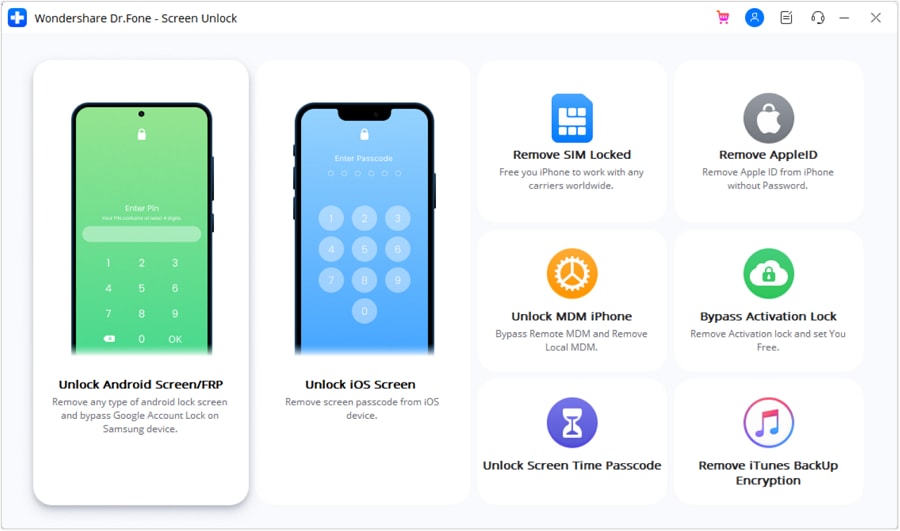
Step 3: Boot your device into Recovery/DFU Mode
You now have to boot your Apple iPhone 7 Plus or iPad device into Recovery mode or DFU mode so that the software can recognize your device for further process. For your convenience, Dr. Fone Screen Unlock (iOS) has a built-in instruction facility that helps you to follow the steps.
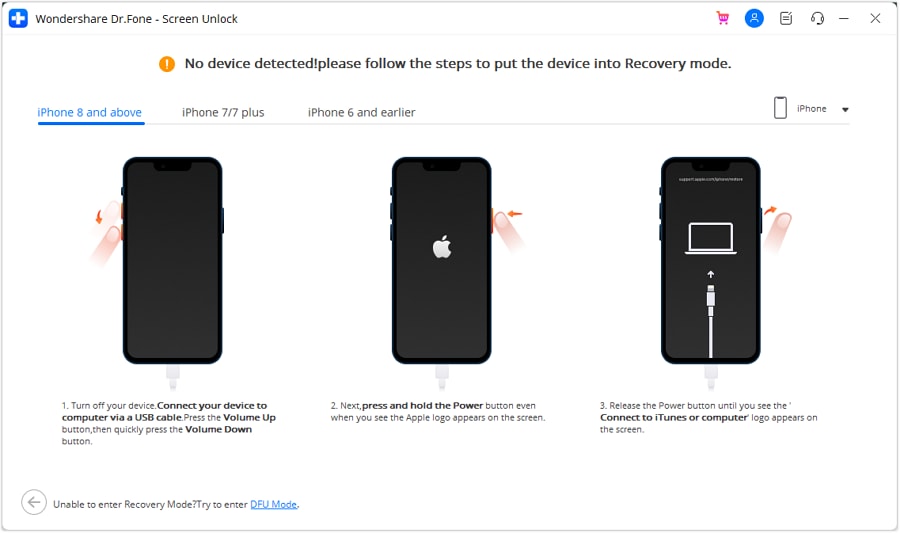
Step 4: Confirm the information and download firmware
After a successful reboot into Recovery mode, the tool will automatically detect your device’s information and the most compatible iOS firmware. To start the process of downloading the firmware, you need to hit on “Start” button.
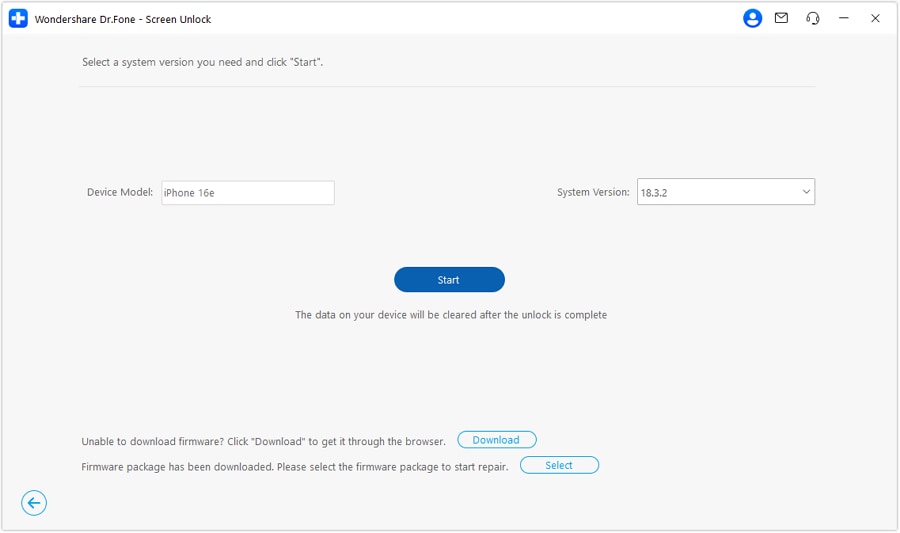
Step 5: Erase an iPhone without an Apple ID password.
Once the download is complete, you can get started with erasing an iPhone without an Apple ID password. Hit the “Unlock Now” button, and voila! In no time, you’ve successfully erased an iPhone without an Apple ID password.
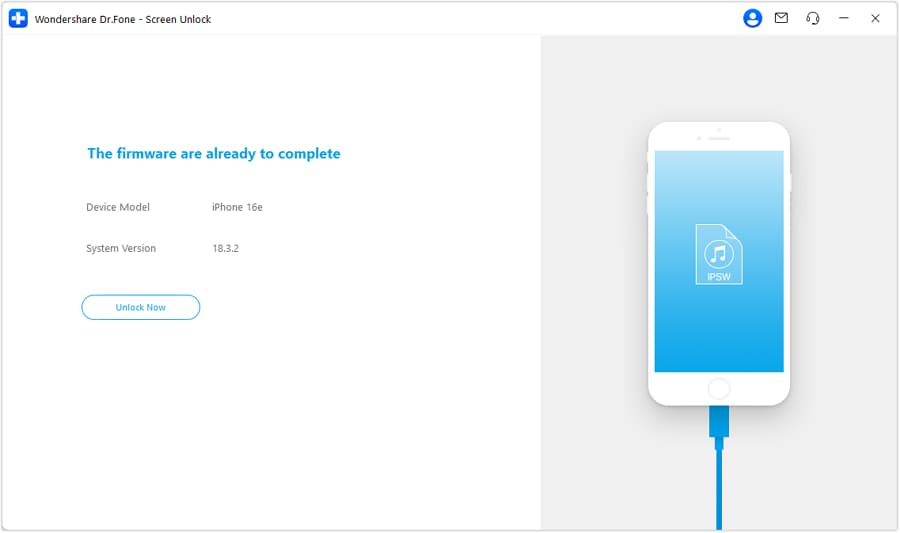
Part 2. Erase an iPhone without Apple ID via iTunes
Sometimes your phone might ask for an Apple ID and password to confirm your authority. In such cases, you may get stuck as either you have forgotten the password to it, or you don’t remember the Apple ID in the first place. For that matter, where it needs immediate help, we have listed down a set of steps that can help you erase an iPhone without Apple ID via iTunes –
Step 1: Connect your Apple iPhone 7 Plus to the computer with the help of a USB and then open your iTunes.
Step 2: The best way to start the process is to move your phone to recovery mode. For this, you need to:
In iPhone 8 or later: Tap the Volume Up, then quickly tap Volume Down and hold down the Power key afterward.
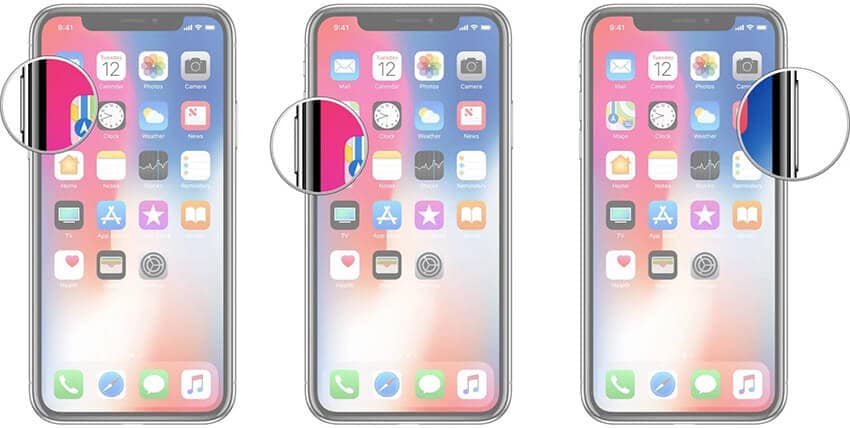
In the case of iPhone 7/7Plus: Press the “Sleep/Power” and “Volume Down” keys together.
Hold down the keys until you see the message on your iTunes screen about “your iPhone has been detected in recovery mode.”
Step 3: Once done, click on “Ok” and choose the “Restore iPhone” option. Confirm your actions, and you’re done.
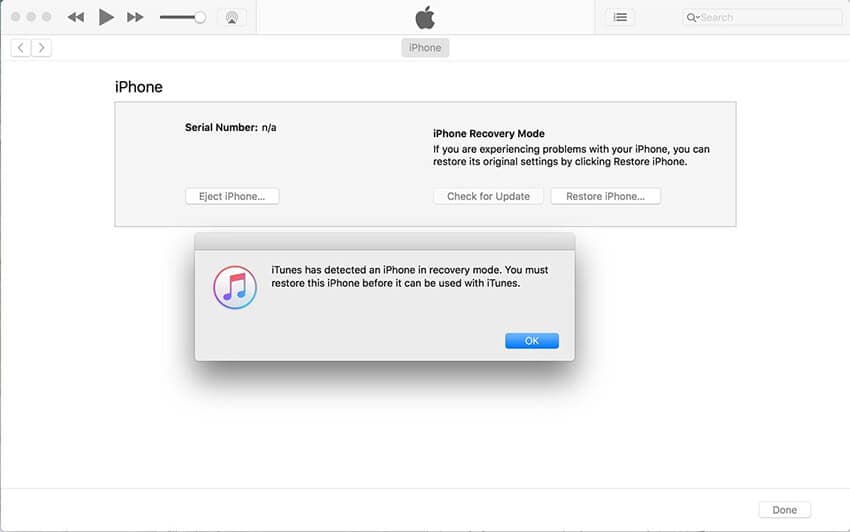
Part 3. How to erase an iPhone without Apple ID via Settings
Erasing an iPhone without Apple ID becomes necessary when we happen to use a second-hand phone or when we share a phone with someone. It is indeed a hard task to overcome these issues as we constantly strive to change our phone or replace it with a second-hand one. We have jotted a few steps that can help you erase an iPhone without Apple ID via settings for your ease.
Step 1: On your Apple iPhone 7 Plus, press the “Settings” icon on your App drawer.
Step 2: Under the Settings, scroll down and click on the “General” option.
Step 3: Now, you need to scroll all the way down to the “Reset” button and click on it. Then, look for “Erase All Content and Settings” and tap on the same.
Step 4: Enter your passcode to confirm. This action will pop up a screen where you need to select Erase iPhone again, and boom, you are done now.
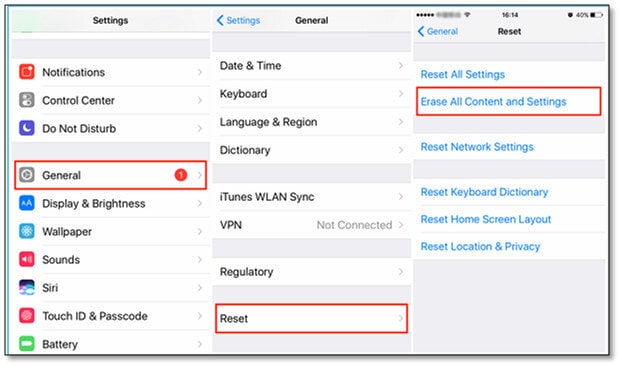
Part 4. Tip you may need to erase Apple ID
Now, just in case you wish to delete your Apple ID completely, you need to perform a simple practice of removing any devices associated with your Apple ID.
Step 1: One can simply visit appleid.apple.com and log in with the Apple ID credentials already allotted to the user.
Note: You might get a prompt of a two-factor authentication code while being on this page.
Step 2: Once you scroll down the line, choose, and click on the “Device” option.
Step 3: Choose the desired device and click on the “Remove from account” option followed by a “Remove this – Device Name” to confirm the action. Perform this step for all other devices.
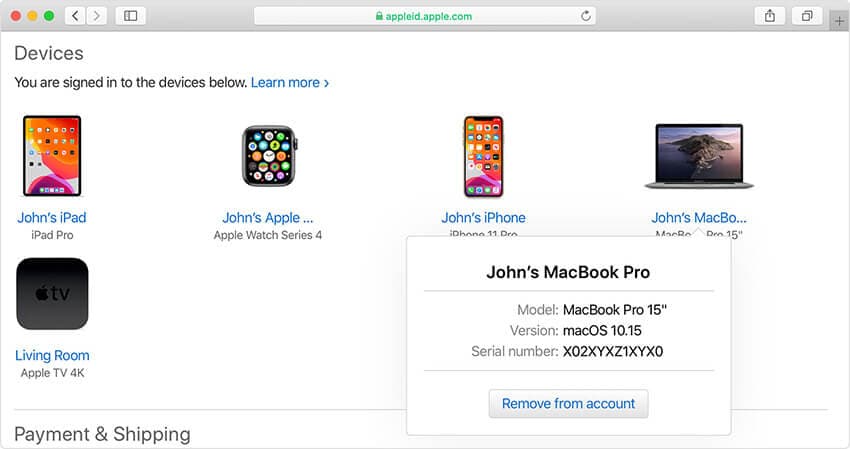
How to erase an Apple ID via Apple’s Data and Privacy website
Now let’s get started with erasing an Apple ID via Apple’s Data and Privacy website are simple and, we have mentioned a simple way to take care of the same:
Step 1: Once you’re done removing the Apple iPhone 7 Plus devices linked to your Apple ID, visit privacy.apple.com and log in with the same Apple ID and password credentials.
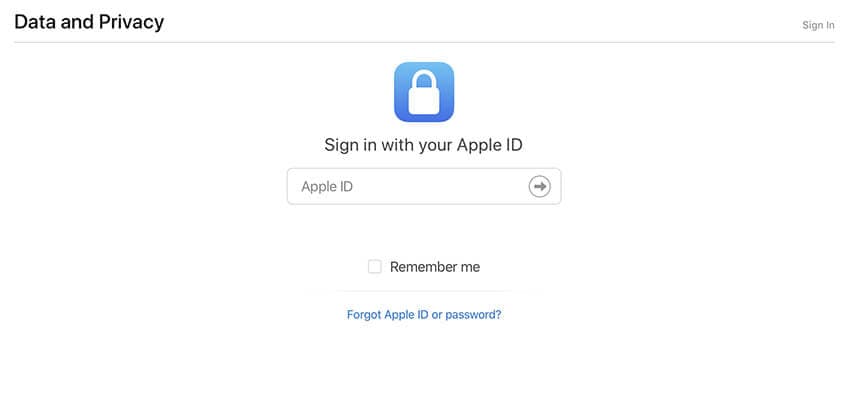
Step 2: Once you authenticate, click on the prompt indicating the option to “Continue.”
Step 3: Once you click on the “Get started” prompt on the screen, you will get a tab to “Delete your account.” This will prompt you with an Apple message indicating the information regarding the deletion process time.
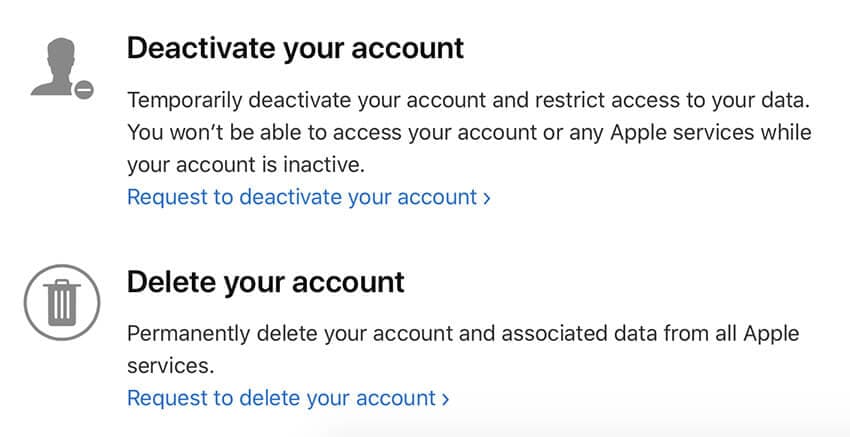
Step 4: Before everything, make sure you back up your data and follow the instructions steps prompted by Apple’s website. This will lead you to choose a reason for deletion from the click-down option and click “Continue.”
Message – You will get the details of the entire process for a quick review before you can submit for the final deletion of the policies
Step 5: Click on “Delete terms and conditions” by checking the read and agreed on the box. Make sure to provide a good call-back number to finalize the process.
Step 6: This submission will give you your access code which you can later use for clarification and, now you can click on the “Delete Account” option
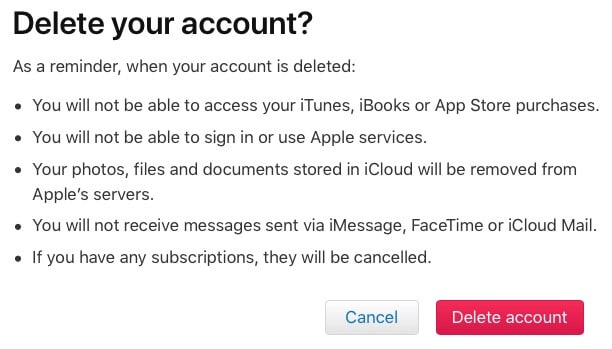
Conclusion
Coming towards the end of the topic, we now are fully sure that you fully understand how to erase an iPhone without an Apple ID. Just in case you have any doubts, please feel free to comment below. And do remember to share this with your friends and family if you find it useful.
How To Unlink Your Apple iPhone 7 Plus From Your Apple ID
iPhones are known for their robust security features. The Apple ID is the central feature used to provide many security services that ensure the safety of personal data. Yet, life often leads you to moments when you must part ways you’re your devices. Be it for selling, gifting, or any other reason.
In such cases, it’s essential to understand how to unlink iPhones from your Apple ID. This 2023 guide is your go-to resource, providing insight into various methods to disassociate your Apple iPhone 7 Plus from your Apple ID, even when facing a forgotten or unrecoverable passcode.
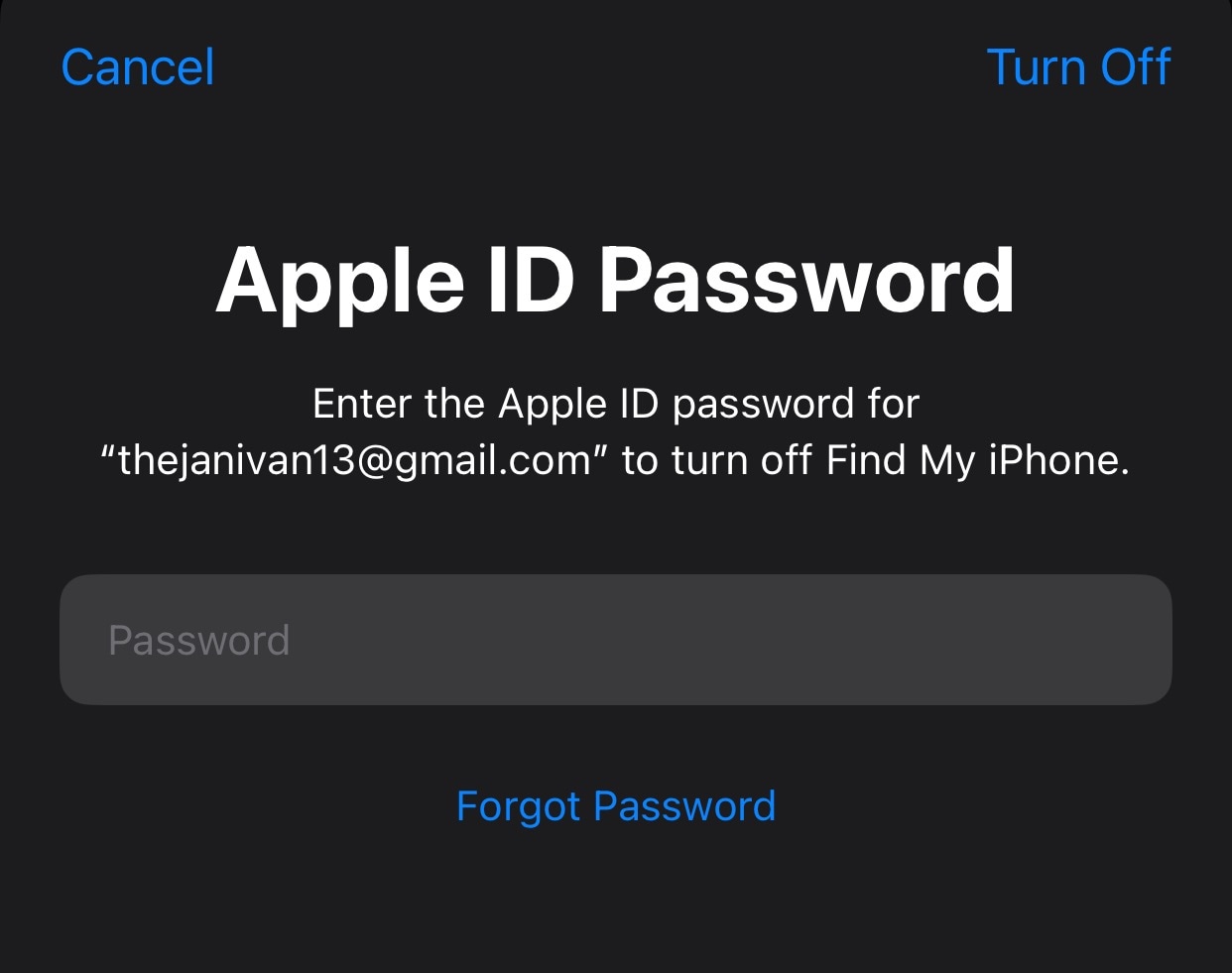
Part 1. How the Apple ID System Works
The Apple ID is like the key to your Apple iPhone 7 Plus’s world. It’s a special account that connects your Apple iPhone 7 Plus to Apple’s services. With it, you can download apps, back up your data, and more. It’s an essential part of your Apple iPhone 7 Plus experience.
Here are ways that it protects your device.
- **Preventing use when stolen.**If your Apple iPhone 7 Plus gets into the wrong hands, your Apple ID keeps it locked. Even if someone tries to reset or erase the phone, they can’t use it without your Apple ID passcode.
- **Preventing use even after reformatting the phone.**Even if you reset or erase your Apple iPhone 7 Plus, it stays locked to your Apple ID. This is super important for keeping your data safe.
- **Other ways.**Apple ID helps you find your lost iPhone and secures your payments and personal info.
Remembering your Apple ID passcode is an intelligent move. It makes managing your Apple iPhone 7 Plus more accessible and safer. Forgetting it can make things tricky, especially when you want to unlink your Apple iPhone 7 Plus from your Apple ID. But don’t worry, there are solutions for that, too!
Part 2. How To Unlink Your Apple iPhone 7 Plus Normally
The usual way to unlink your Apple iPhone 7 Plus from your Apple ID is recommended, especially when remembering your Apple ID passcode. This ensures a smooth and secure transition for your device. Here’s how you can do it, step-by-step:
Step 1. Sign out of Apple ID (through Settings):
Open your Apple iPhone 7 Plus’s Settings.
Scroll down and tap on your name at the top.
Next, scroll to the bottom of the screen and choose Sign Out.
You’ll be asked to enter your Apple ID passcode and tap Turn Off.
Confirm by selecting the data you want to keep on your Apple iPhone 7 Plus.
Finally, tap Sign Out.
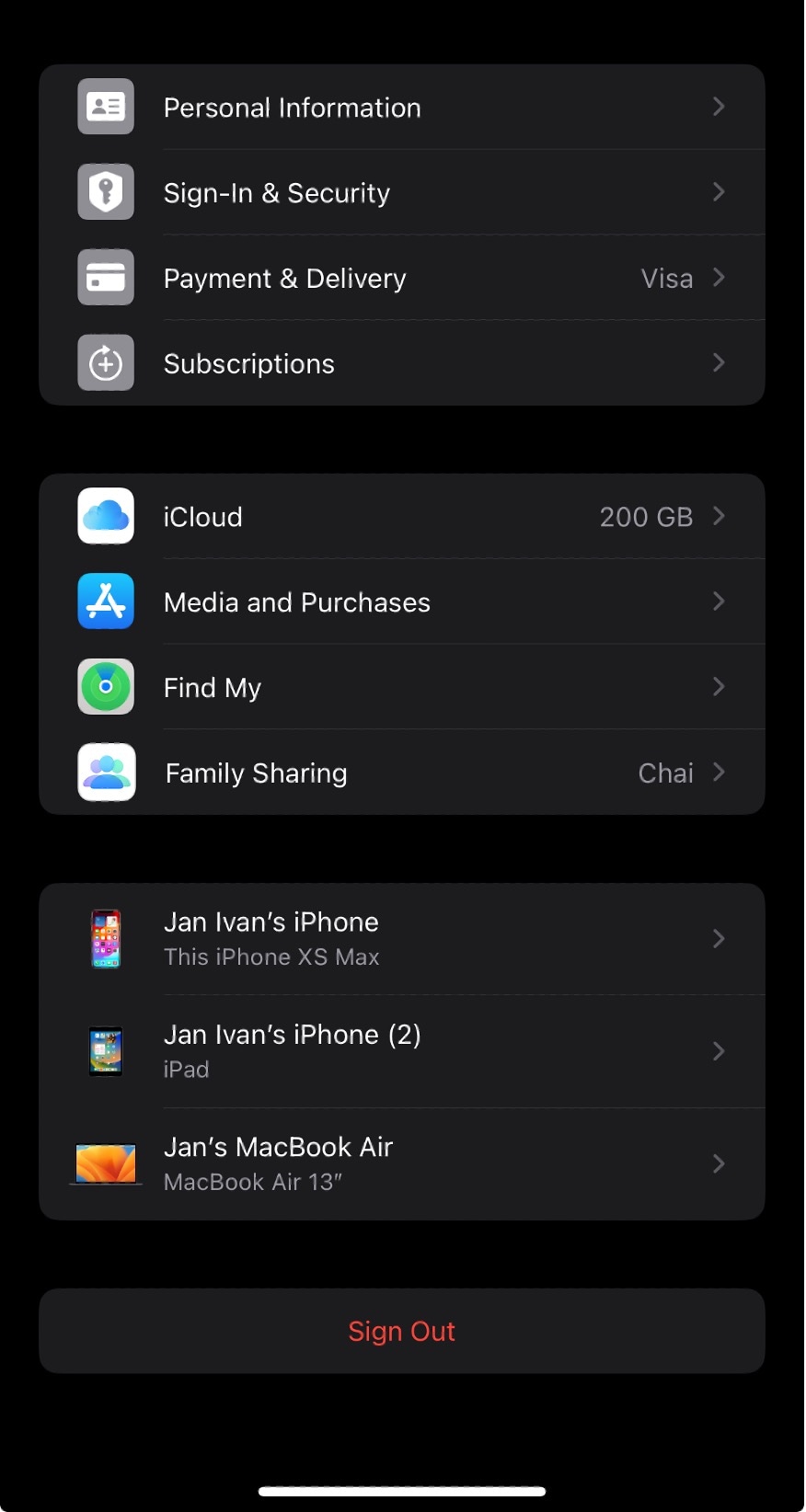
Step 2. Deactivating iMessage and FaceTime:
After signing out of your Apple ID, go back to
Scroll down to Messages and tap it.
Turn off iMessage by flipping the switch.
Go back to Settingsand tap FaceTime.
Turn off FaceTime by flipping the switch.

Step 3. Reformat the phone:
Return to
Scroll down and tap
Scroll down and select
Choose Erase All Content and Settings.
Confirm this action. Your Apple iPhone 7 Plus will reset to its original state.
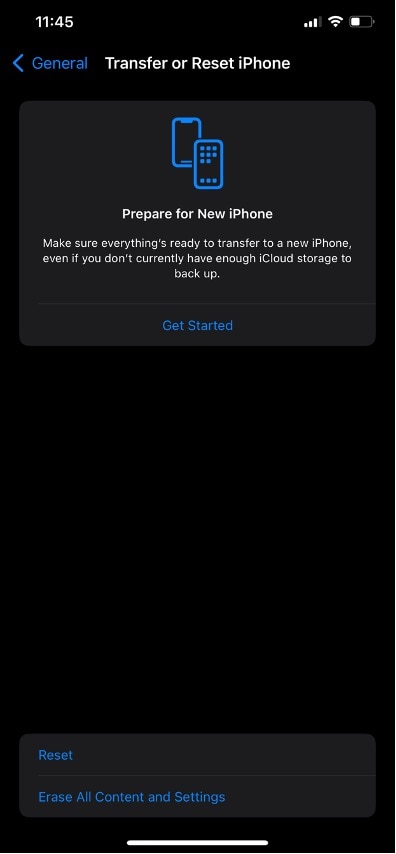
Following these steps, your Apple iPhone 7 Plus will be unlinked from your Apple ID and ready for a new user or any other purpose. Remember, this method is best when you can easily recall your Apple ID passcode.
Part 3. What To Do If You Forgot Your Apple ID Passcode
If you still need to remember your Apple ID Passcode, following the steps in the previous section would be unadvisable, as it will leave your Apple iPhone 7 Plus locked and inaccessible. In this case, recovering your Apple ID Passcode is essential before unlinking iPhones.
These are some ways to recover your Apple ID passcode:
Use the Forgot Your Password Option
Start by going to the Apple ID account page or using the “Forgot Your Apple ID or Password?” link on your Apple iPhone 7 Plus’s login screen. You must enter your Apple ID and follow the steps provided to reset your passcode. Apple will guide you through resetting your Apple ID passcode, often requiring you to verify your identity via email or other security questions.

Contact Apple Customer Service
If the above method doesn’t work or you’re facing difficulties, contacting Apple Customer Service is a good idea. They can assist you in recovering your Apple ID passcode and provide expert guidance.
After recovering your Apple ID Passcode, you can perform the steps outlined in the previous section to unlink your Apple iPhone 7 Plus normally. With your passcode in hand, the process becomes straightforward, allowing you to maintain control of your device while preparing it for a new user or another purpose. Remember, your Apple ID Passcode is a vital key to unlocking the full potential of your Apple iPhone 7 Plus, so it’s essential to keep it safe and secure.
Part 4. If You Can’t Recover Your Passcode: Wondershare Dr.Fone
If, for instance, you find yourself in a situation where you really can’t recover your Apple ID passcode, or perhaps you’ve reformatted your phone without unlinking your Apple ID, leaving it inaccessible, it’s time to turn to a trusted third-party tool to help you unlock and unlink your Apple ID from your Apple iPhone 7 Plus.
Wondershare Dr.Fone is a versatile and powerful phone management tool designed to assist you in various aspects of your iOS device. It offers a range of features to help you manage and troubleshoot your Apple iPhone 7 Plus, including data recovery, system repair, and device unlocking. It’s a user-friendly solution that caters to your needs when dealing with complex issues like opening your Apple iPhone 7 Plus from an Apple ID.

One of Dr.Fone’s standout features is the Screen Unlock feature. It is an invaluable tool when facing challenges like an inaccessible iPhone due to a forgotten Apple ID passcode or a device that has been reformatted without unlinking the Apple ID. With Dr.Fone – Screen Unlock, you can learn how to unpair iPhones from the previous Apple ID, ensuring you can use it effectively.
How To Unlink Apple ID With Wondershare Dr.Fone – Screen Unlock
Before anything, be warned that this method removes all data from an iPhone. Creating a backup of your phone before performing the steps below is best.
Step 1: Launch Dr.Fone. Click Toolbox and then select Screen Unlock (iOS).
Step 2: Click Remove Apple ID.
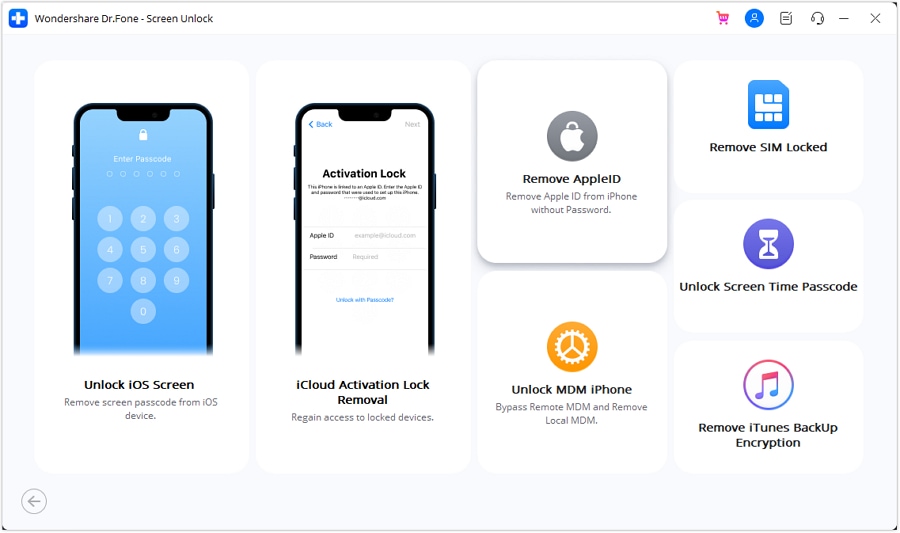
- Step 3: Connect your Apple iPhone 7 Plus to your computer. Click Unlock Now once you’ve confirmed its connection.
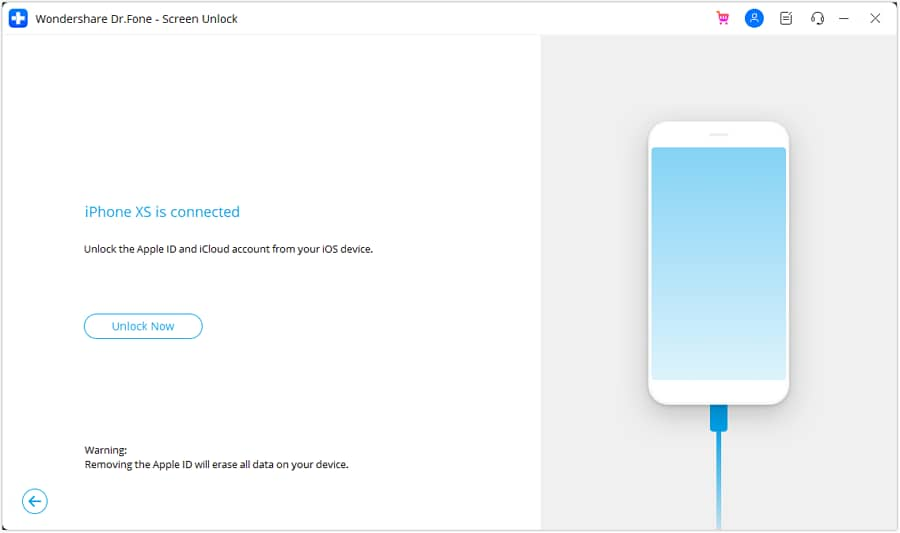
- Step 4: Click Yes on the screen lock verification page.
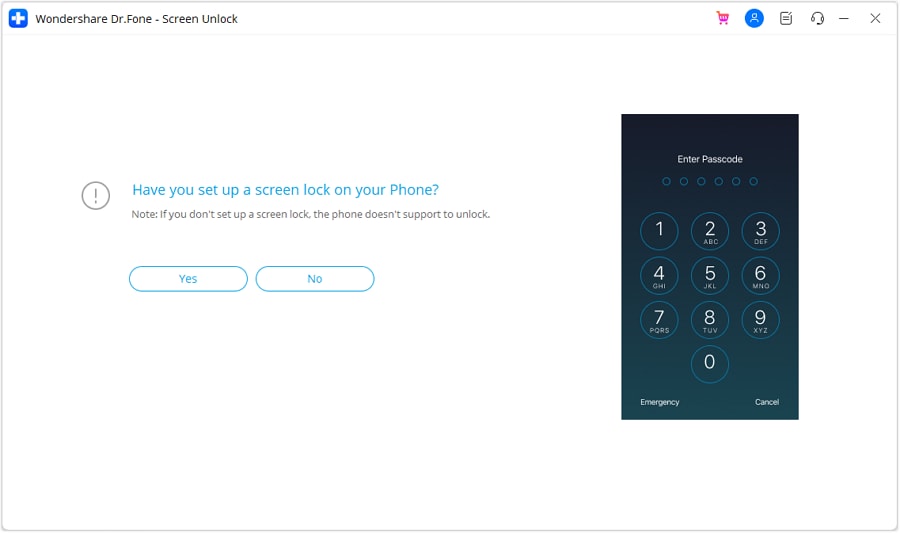
- Step 5: Click Yes on the Two-Factor Authentication verification page.
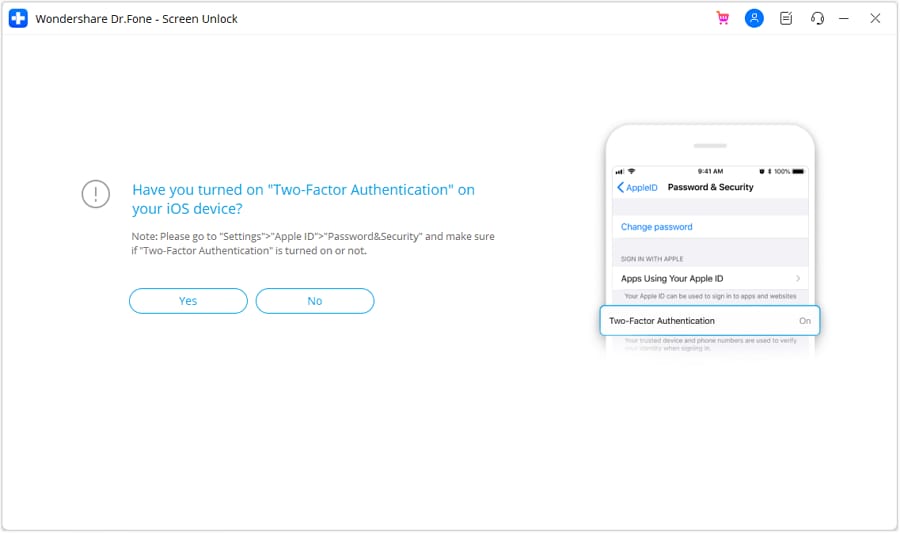
- Step 6: Follow the instructions to put your device into Recovery Mode. If they don’t work, click Try DFU Mode.
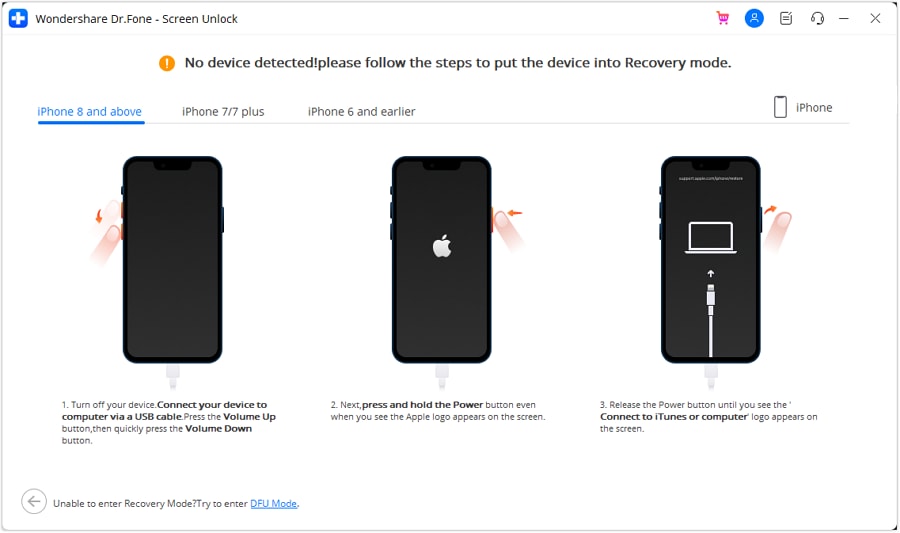
- Step 7: Verify your device details**.** Edit manually for any discrepancies. Click Start once done.

- Step 8: The firmware will start downloading. If it is slow, click Copy for a direct download link of the firmware.
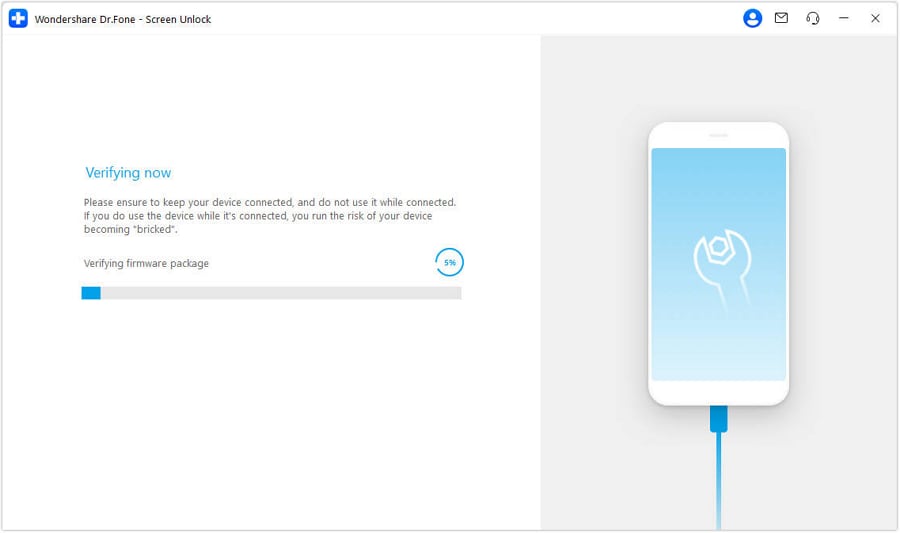
- Step 9: Click Unlock Now once downloading is done.

- Step 10: Input the code “000000” on the appearing prompt and click Unlock.
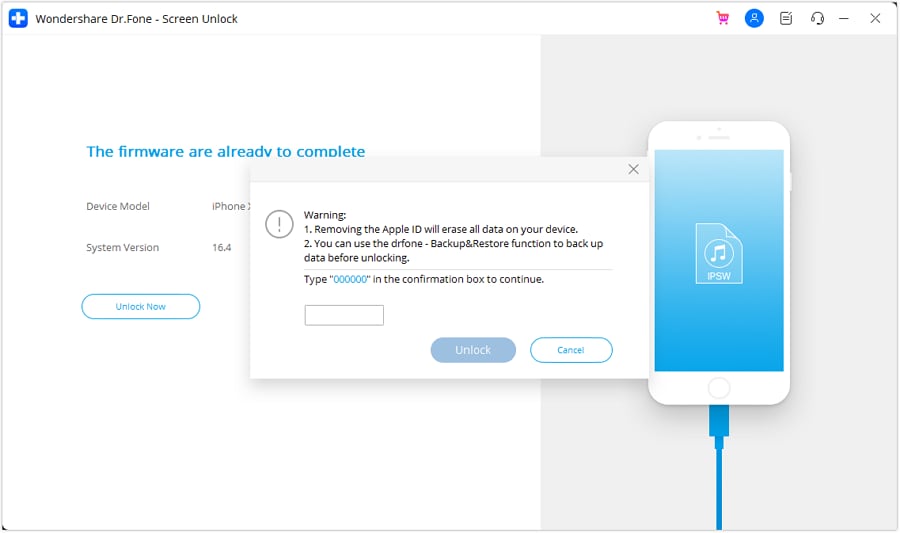
- Step 11: Avoid any disconnection during the unlocking process.
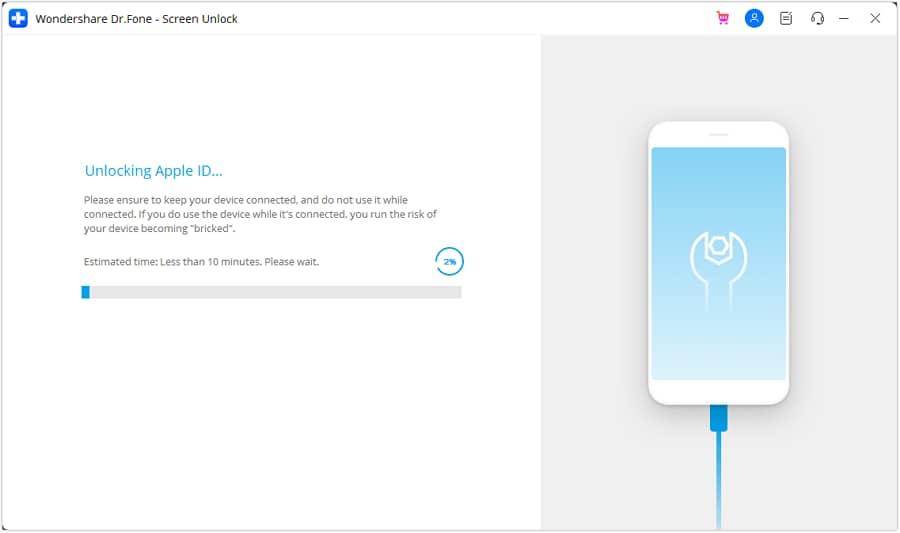
- Step 12: Click Done once you see this page. Click Try Again if the method does not work.
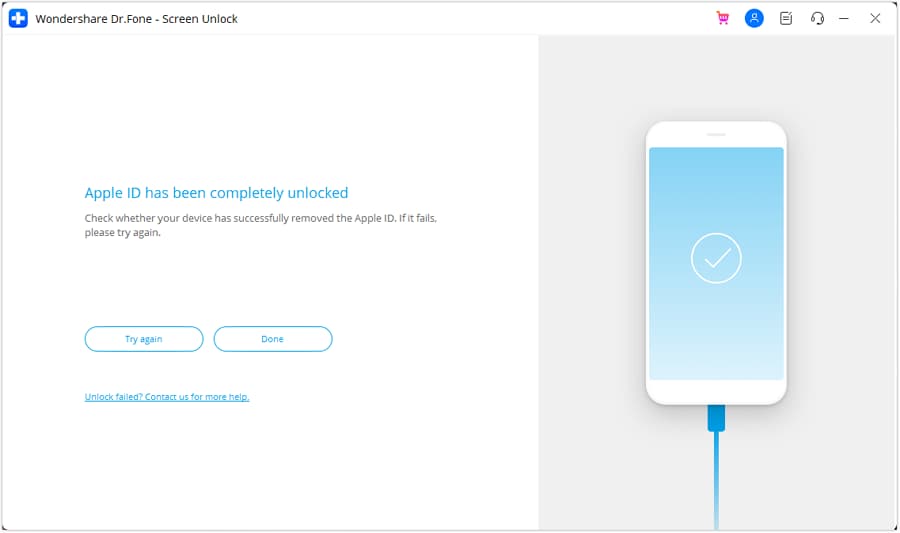
Conclusion
In summary, this guide has navigated you on how to unlink iPhones from their Apple ID, covering both the normal process and what to do when you’ve forgotten your passcode. However, the critical lesson here is remembering your Apple ID passcode to avoid unnecessary complications.
Should you ever find yourself locked out of your device, Wondershare Dr.Fone - Screen Unlock emerges as your go-to solution. The all-around phone management tool can rescue you from tricky situations and help you unlink your device effortlessly. Remember to keep your Apple ID passcode safe and handy, but know that Dr.Fone has your back when you need it.
Turning Off Two Factor Authentication On Apple iPhone 7 Plus? 5 Tips You Must Know
Apple has produced one of the most consumed, acknowledged, and preferred smartphones that allowed them to rule the industry for a considerably long period of time. Their style and presentation were not the only reason that made people look forward to buying an iPhone. Apple created its own operating system and presented their own versions of security and protection. One of the most recognized and impeccable features offered by Apple in its innovative structure was the security and safety through Apple ID and Apple Account. Every important feature that operated throughout the Apple iPhone 7 Plus or iPad was focused over a single entity, the Apple ID. However, apart from the Apple ID, there were several other layers of authentications and verifications that were added throughout the protocol structure. A couple of them are renowned as Two Factor Verification and Two Factor Authentication. This article produces a very generous set of advice that should be looked over while handing these layers of protection. To get a better understanding of the procedures involved, you need to look over the guide to gain better knowledge on how to turn off Two Factor Authentication on your Apple.

Part 1. Is two-step verification the same as two-factor authentication?
There might be a few differences involved in these two security models; however, it should be kept in mind that they focus their purpose on securing the Apple ID of the user. Two Factor Verification is a security protocol that protects access to the various activities performed through the Apple ID. It attenuates an extra verification step across the Apple iPhone 7 Plus device in addition to the password for the Apple ID. The device receives a verification code from an authentication factor that allows the authorities to confirm the credibility of the user.
The Two Factor Authentication is considered as an upgrade to the Two Factor Verification, which was released two years after the Two Factor Verification, in 2015. This authentication method exempted the offline recovery keys and application-specific passcodes. They added a six-digit authentication code onto the original password and produced an offline, time-dependent code that is to be generated through the Settings of the trusted device of the user. This feature was appended into the iOS 9 and OS X El Capitan with a region-specific target.
Part 2. How to turn off two-step verification?
As you are aware of the Two-Step Verification process, it is quite easy and typical in configuring. However, when it comes to turning the settings off, it is also a simple and straightforward procedure that can be easily covered by following the steps provided below.
Step 1: You are required to open the Apple ID Account web page on your browser and sign in with your Apple ID credentials.
Step 2: As you log into the website, access the “Security” section, and tap “Edit” from the options provided on the list.
Step 3: Tap on the “Two-Step Verification” option and turn it off. Confirm to conclude the process. You may be required to select the new security questions and verify the data of birth in the process. As you would be done with it, an email would be received across your connected address for confirmation.
Part 3. How to turn off two-factor authentication? (lower than iOS 10.3)
Two Factor Authentication cannot be turned off in a few cases and accounts for iOS versions greater than 10.3. However, if you have activated Two Factor Authentication across the iOS versions lower than 10.3, you can deactivate the feature through a series of simple steps. The exemption of this security feature across your device leaves it protected only through a password and a few security questions. For turning off the Two Factor Authentication from your Apple device, you need to follow the steps provided as follows:
Step 1: Open your browser and access your Apple ID Account website. Provide the details of your Apple ID and log in.
Step 2: Tap on “Edit” in the “Security” section and turn off the “Two Factor Authentication” option.
Step 3: This would lead you to set new security questions for the Apple ID account, followed by a verification of your date of birth. The successful execution of the process would lead to turning it off.
Part 4. Why can’t you turn off two-factor authentication if you already use it? (iOS 10.3 and later)
For users who have an Apple device with an iOS 10.3 or later version, they cannot turn the Two Factor Authentication off after it is accessed. The latest iOS and macOS included extra layers of security in their features, which led towards a better security foundation and protection of information. Users who have updated their account information can unenroll in two weeks after updating. For this, you are required to simply access the confirmation email that you have received and tap on the link to approach the previous security settings. Thus, it makes it far more than impossible for users to turn their Two Factor Authentication off if they consider it unnecessary for their device. This feature is something that would always remain intact with their device as an extra layer of security. Its absence does leave a chance of illegal access to the Apple iPhone 7 Plus device and an increased risk of a security breach. Since it is directly built across the Apple iPhone 7 Plus device and its settings, this makes it a very hard-to-approach characteristic.
Part 5. How to turn off two-factor authentication by removing Apple ID
Users who are very reluctant to remove the two-factor authentication off their device can consider removing the Apple ID itself for fulfilling the purpose. However, when it comes to executing such tasks, the need for a third-party platform gets evident. Third-party platforms provided dedicated services in providing users with a unique platform of operation with an environment that suits their purpose perfectly. Many platforms provide such impressive services, yet the selection gets quite difficult for a series of reasons. The following pointers explain the reasons to the users over why they should focus on selecting a platform such as Dr. Fone – Screen Unlock (iOS) for this purpose.
- You need to have no excessive knowledge of handling the platform.
- You can cover all the dynamics of unlocking the Apple iPhone 7 Plus device without the use of iTunes.
- The platform provides you with the ability to unlock the passcode of your Apple device with ease.
- It offers you to protect your device from the disabled state.
- Works across all models of iPhone, iPad, and iPod Touch.
- Provides services to the latest version of iOS.
Dr. Fone – Screen Unlock (iOS) makes it easy for the users to control and remove their Apple ID and disable the two-factor authentication across their device. However, when it comes to controlling the platform, it follows a few simple and efficient steps that would guide you in executing the task successfully.
Step 1: Connect your Device and Launch Application
You need to connect your Apple device with the desktop and launch Dr. Fone across the computer. Tap on the “Screen Unlock” tool present on the home window and proceed with the removal of two-factor authentication.

Step 2: Access Appropriate Option
On the next screen that opens, you are required to select “Unlock Apple ID” from the three options. Proceed to your Apple device to take the process further.

Step 3: Trust the Computer
Open the Apple iPhone 7 Plus device and tap on “Trust” over the prompt that appears on the screen. Following this, you need to navigate to the Settings of your device to initiate a reboot.
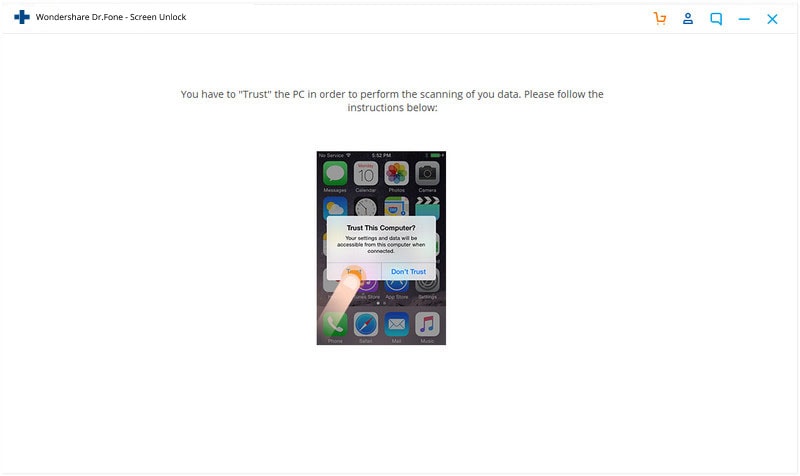
Step 4: Execution of Process
Once you are done with initiating a reboot, the platform automatically detects the update in the process and initiates removing the Apple ID from the Apple iPhone 7 Plus device. Once the platform is done with the process, it provides a prompt message in the next window displaying the execution of the removal of Apple ID from your device. This also removes the Two Factor Authentication off your device.

Conclusion
The article has presented a very detailed comparison of the Two Factor Verification and Two Factor Authentication and provided an elaborated discussion over how to turn these security features off their devices. The article also discussed a third-party platform that would guide in removing such security features of the Apple iPhone 7 Plus devices over the requirement of the user. You need to go through this article to get a better knowledge of the execution of the mechanism.
Also read:
- [New] 2024 Approved Laugh Ledger Comedy Chronicles From Twitter's Best Videos
- [New] Revolutionizing Receiving A New Paradigm in Openings for 2024
- [Updated] Binge & Float Navigating the PIP Functionality for Seamless Watching for 2024
- [Updated] Reinforcing Windows Photo Viewer Functionality in Windows 10
- 2024 Approved Aural Artistry The Magic of Sound Fading
- 3 Ways of How to Get Someones Apple ID Off Apple iPhone 7 without Password
- Best Methods for Motorola Razr 40 Wont Turn On | Dr.fone
- Comprehensive Analysis of the Netgear Nighthawk RAX120 - Ultimate Speed & Performance
- Guide on How To Remove Apple ID From Apple iPhone 6s Plus
- How To Fix Apple ID Verification Code Not Working From iPhone 7
- How To Remove the Two Factor Authentication From iPhone 12 mini
- How to Resolve the 'Access Denied by Device Path' Error in Windows Systems
- In 2024, How to Fix Locked Apple ID from Apple iPhone 8
- In 2024, How To Remove Phone Number From Your Apple ID from Your iPhone 12 mini?
- In 2024, Reawakening Dormant Connections with Your OBS Cam
- In 2024, Tips and Tricks for Apple ID Locked Issue On Apple iPhone 12 Pro
- Troubleshooting Error Connecting to the Apple ID Server On Apple iPhone 6 Plus
- Title: In 2024, How to Erase an Apple iPhone 7 Plus without Apple ID?
- Author: Alma
- Created at : 2025-01-30 23:15:11
- Updated at : 2025-02-01 01:49:31
- Link: https://apple-account.techidaily.com/in-2024-how-to-erase-an-apple-iphone-7-plus-without-apple-id-by-drfone-ios/
- License: This work is licensed under CC BY-NC-SA 4.0.